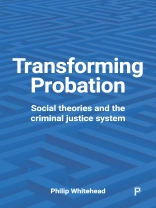Written by an established author in the field, this book explores the politics of modernisation and transformation of probation in the criminal justice system. It is unique in drawing upon innovative social theories and moral perspectives to analyse changes in the probation service by including data from quantitative and qualitative empirical research. This highlights the challenges to, but also support of, the platform of modernisation that culminated in the transformative Rehabilitation Revolution. Providing critical tools for the reader to use in their own work and studies, it makes a timely contribution to criminal justice and probation theory and uniquely provides insights into what representatives of other organisations think about probation – from the outside looking in.
Table of Content
Modernising probation and criminal justice since 1997;
Durkheim, Weber, Marx, Foucault, and the Symbolic: social theory with the ‘big guys’;
Religious, humanitarian and personalist impulses: footprints left by ‘the good guys’;
Social theory and organizational complexity: putting theories and impulses to work;
Researching modernization and cultural change in probation: views of solicitors, clerks, magistrates, barristers and judges;
Modernizing monstrosities and cultural catastrophes: probation trapped in a new order of things.
About the author
Philip Whitehead is Professor in Criminal and Social Justice at the University of Teesside. After studying theology at Manchester University and later qualifying as a social worker/probation officer at Lancaster University, Philip worked for the Probation Service in the North East of England before being appointed lecturer at Teesside University in 2007. He has written widely on the history and modernisation of the probation service.







![Cover of Sarah B. B. (University of Central Florida, Orlando, FL, USA) Bush & Kristin L. L. (Bellarmine University, USA) Cook: Simplifying STEM [6-12] Cover of Sarah B. B. (University of Central Florida, Orlando, FL, USA) Bush & Kristin L. L. (Bellarmine University, USA) Cook: Simplifying STEM [6-12]](https://static.worldofdigitals.com/thumb_webp/414/9781071932414.webp)




